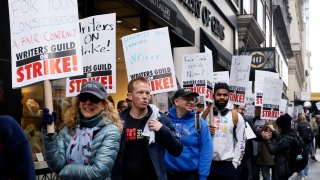
- More than 11,000 film and television writers are on strike.
- It's the first strike of its kind during the streaming era.
- Production on daily late-night shows is expected to go dark this week.
- It could take awhile for disruptions to affect TV series and movies.
Hollywood writers are officially headed to the picket line, halting production on a slate of film and television projects in the process.
More than 11,000 film and television writers, who say their compensation doesn't match the revenue generated in the streaming era, are on strike for the first time since 2007-08. That work stoppage lasted 100 days and disrupted production on several series and films.
Writers Guild of America members are set to start walking picket lines Tuesday afternoon. Under strike rules, they are prohibited from doing work on any television or film projects for the duration of the stoppage.
Most immediately, this will have a significant impact on late-night shows, where writers are tasked with crafting timely and topical jokes. Production on daily shows, including "The Tonight Show Starring Jimmy Fallon," "The Late Show with Stephen Colbert" and "Late Night with Seth Meyers," is expected to go dark this week.
Late-night hosts have been in favor of the strike, offering up segments to support their writing staffs. "I wouldn't have a show if it wasn't for my writers, I support them all the way," Fallon said of the strike during Monday's annual Met Gala in New York City. "I couldn't do the show without them."
Get Tri-state area news delivered to your inbox. Sign up for NBC New York's News Headlines newsletter.

Other timely shows, like NBC's "Saturday Night Live," could also shut down this week. It's unclear what kind of immediate impact the strike will have on daytime talk shows, which often rely more heavily on interviews and banter between hosts than on scripted monologues or jokes.
Money Report
Meanwhile, scripted comedies and dramas may be forced to cut their seasons short or delay filming. If the strike continues into the summer, broadcast TV's fall season would also be delayed, as preparations typically begin in late spring and summer.
Depending on the strike's duration, at-home viewers and moviegoers might not notice the strike's impact until it's over. That's because many shows and films have already wrapped production and will enter the marketplace unaffected by the strike.
However, if the strike is prolonged, production shutdowns will catch up with content release timelines, much like they did during the pandemic. Theatrical releases likely wouldn't be affected until the last quarter of 2023 or early 2024.
This is the first strike of its kind during the streaming era. Streamers have relatively more flexibility than networks and theaters and could choose to promote legacy content on their platforms or license material from other countries in order to pad their libraries in the event of content shortages.
The strike is only the second of its kind in nearly four decades. The length of the last strike encouraged the growth of reality unscripted shows. It's possible this strike will be lengthy as well. Leading up to the deadline, the two parties were said to be far apart on a number of key bargaining issues.
The WGA is seeking higher compensation and residuals, particularly when it comes to streaming shows, as well as new rules that will require studios to staff television shows with a certain number of writers for a specific period. The guild also is seeking compensation throughout the process of pre-production, production and post-production. Currently, writers are often expected to provide revisions or craft new material without being paid.
What's different this time
The film and television landscape is radically different than it was in 2007, and the changes brought on by the streaming era are at the core of this strike.
While the explosion of streaming services such as Netflix and Disney+ has ushered in a glut of TV shows and movies, the WGA says its writers aren't seeing requisite benefits. Instead, they feel they've been shortchanged on compensation as studios, networks and streaming platforms write a new rulebook in real time. Consequently, they're seeking pay increases, plus structural changes to the business model undergirding the shows and movies they write for.
According to WGA statistics, median writer-producer pay has declined 4%, or 23% when adjusted for inflation, over the last decade, while streaming platforms have become increasingly popular.

"The companies have used the transition to streaming to cut writer pay and separate writing from production, worsening working conditions for series writers at all levels," the guild said in a March memo.
WGA writers have taken particular issue with the length of series in the streaming era, which tend to run fewer episodes than broadcast shows. Writers say that has made it difficult to make a consistent income. The growth of streaming also has all but killed residual fees, in which writers profit every time a show is put into syndication or aired abroad.
Unlike the 2007 strike, writers currently have social media on their side and are rallying on platforms like Twitter, Instagram and TikTok to get their message out.
"We're going on strike to remind them that while our work has made them rich, without us they have nothing," wrote Adam Conover, the creator of "Adam Ruins Everything" and "The G Word with Adam Conover," in a tweet. "It's going to be hard, but we're going to win, because we're going to stand together, be honest with each other, and fight for each other. And when we do that, we win."
What studios are offering
In recent years, media companies have faced a tricky economic landscape, as studios and streamers faced pressure to make their streaming platforms profitable. Many studios and companies, including Netflix, have cut spending on content as they try to turn a profit. Streaming's popularity has also led to declining television ad revenue for traditional networks.
Producers have argued that the streaming business is new and studios and networks still don't know what profit margins will look like in the future.

The Alliance of Motion Picture and Television Producers, which represents networks, streamers and studios, said it offered "generous increases in compensation" for writers, and "improvements in streaming residuals."
According to the AMPTP, the primary sticking points in negotiations have concerned union proposals that would require companies to staff shows with an allotted number of writers, whether needed or not, for certain periods of time.
While producers said they were prepared to increase their offers for higher pay and residuals, there were concerns about the "magnitude" of other proposals from the WGA that were still on the table, AMPTP said.
Among those proposals included one that material produced through artificial intelligence or similar technologies be more carefully regulated so that studios cannot use AI to undermine writers or skimp on compensation.
Disclosure: Comcast is the parent company of NBCUniversal and CNBC. NBCUniversal is one of the entertainment companies represented by the Alliance of Motion Picture and Television Producers. Some editorial employees of the NBCUniversal News Group are represented by the Writers Guild of America.






